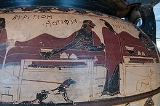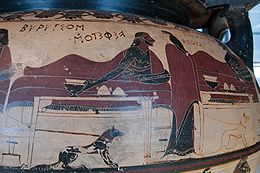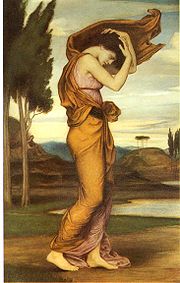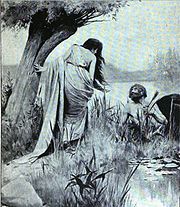
Iole
Encyclopedia

Greek mythology
Greek mythology is the body of myths and legends belonging to the ancient Greeks, concerning their gods and heroes, the nature of the world, and the origins and significance of their own cult and ritual practices. They were a part of religion in ancient Greece...
, Iolë (Ancient Greek: ) was the daughter of Eurytus
Eurytus
Eurytus, Erytus , or Eurytos is the name of eleven characters in Greek mythology, and of at least one historical figure.-King of Oechalia:...
, king of the city Oechalia. According to the brief epitome by the so-called Apollodorus, Eurytus had a beautiful young daughter named Iole who was eligible for marriage. Iole was claimed by Heracles
Heracles
Heracles ,born Alcaeus or Alcides , was a divine hero in Greek mythology, the son of Zeus and Alcmene, foster son of Amphitryon and great-grandson of Perseus...
for a bride, but Eurytus refused her hand in marriage. Iole was indirectly the cause of Heracles's death because of his wife's jealousy of her.
There are different versions of the mythology
Mythology
The term mythology can refer either to the study of myths, or to a body or collection of myths. As examples, comparative mythology is the study of connections between myths from different cultures, whereas Greek mythology is the body of myths from ancient Greece...
of Iole from many ancient sources. The pseudo-Apollodorus
Apollodorus
Apollodorus of Athens son of Asclepiades, was a Greek scholar and grammarian. He was a pupil of Diogenes of Babylon, Panaetius the Stoic, and the grammarian Aristarchus of Samothrace...
gives the most complete story followed by slight variations of his from Seneca
Seneca the Younger
Lucius Annaeus Seneca was a Roman Stoic philosopher, statesman, dramatist, and in one work humorist, of the Silver Age of Latin literature. He was tutor and later advisor to emperor Nero...
and Ovid
Ovid
Publius Ovidius Naso , known as Ovid in the English-speaking world, was a Roman poet who is best known as the author of the three major collections of erotic poetry: Heroides, Amores, and Ars Amatoria...
. Other ancient sources (i.e. Diodorus Siculus
Diodorus Siculus
Diodorus Siculus was a Greek historian who flourished between 60 and 30 BC. According to Diodorus' own work, he was born at Agyrium in Sicily . With one exception, antiquity affords no further information about Diodorus' life and doings beyond what is to be found in his own work, Bibliotheca...
, Gaius Julius Hyginus
Gaius Julius Hyginus
Gaius Julius Hyginus was a Latin author, a pupil of the famous Cornelius Alexander Polyhistor, and a freedman of Caesar Augustus. He was by Augustus elected superintendent of the Palatine library according to Suetonius' De Grammaticis, 20...
, and Pseudo-Plutarch
Pseudo-Plutarch
Pseudo-Plutarch is the conventional name given to the unknown authors of a number of pseudepigrapha attributed to Plutarch.Some of these works were included in some editions of Plutarch's Moralia...
) have similar information on Iole with additional variations.
Heracles' love for Iole leads to his death

Archery
Archery is the art, practice, or skill of propelling arrows with the use of a bow, from Latin arcus. Archery has historically been used for hunting and combat; in modern times, however, its main use is that of a recreational activity...
and taught his sons his knowledge of the bow and arrow. The sons of the king shot their arrows and hit their targets. In fact, they shot so well that they beat all the others from the kingdom. Heracles heard of the prize and eagerly entered the contest for he very much wanted Iole. Heracles shot and hit the bullseye and even beat Eurytus's scores. The irony is Eurytus years earlier had taught Heracles to become an archer.
When the king realized that Heracles was winning, he stopped the contest and would not allow him to participate. Eurytus was aware that Heracles had killed his previous wife, Megara
Megara (mythology)
In Greek mythology, Megara was the oldest daughter of Creon, king of Thebes. In reward for Heracles' defending Thebes from Orchomenus in single-handed battle, Creon offered his daughter Megara to Heracles and he brought her home to the house of Amphitryon...
, and their children. He was afraid that Heracles would very likely kill Iole and any grandsons she may have should Heracles get into a mad rage again. Although Heracles had won the contest fair and square, he was not entitled to the prize because of his reputation. Eurytus broke his promise to give the royal daughter to the winner of the archery contest.
Iphitos urged his father to reconsider, but Eurytus did not alter his decision. Heracles had not left the city yet when Eurytus's mares were run off, presumably by Autolycus, a notorious thief. Iphitos asked Heracles to help find them, which he agreed to do. Heracles, in one of his fits, got frustrated with the complete mess and hurled Iphitos over the city walls, murdering him. Diodorus Siculus gives additional at this point that it was Heracles himself that drove off the mares of Eurytus in revenge. Heracles had failed in his courtship to win Iole.
After the archery contest, Heracles went to Calydon
Calydon
Calydon was an ancient Greek city in Aetolia, situated on the west bank of the river Evenus. According to Greek mythology, the city took its name from its founder Calydon, son of Aetolus. Close to the city stood Mount Zygos, the slopes of which provided the setting for the hunt of the Calydonian...
where on the steps of the temple Heracles saw Deianira
Deianira
Deïanira or Dejanira is a figure in Greek mythology, best-known for being Heracles' third wife and, in the late Classical story, unwittingly killing him with the Shirt of Nessus...
, Prince Meleager
Meleager
In Greek mythology, Meleager was a hero venerated in his temenos at Calydon in Aetolia. He was already famed as the host of the Calydonian boar hunt in the epic tradition that was reworked by Homer....
's sister. Heracles forgot about Iole, at least for the time being, as Deianira was a prospect for his new children that he very much wanted. He wooed her, eventually won her over, and ultimately married her. Heracles acquired a kingdom at this time. He was still angry at Eurytus for not giving up Iole, the promised prize. Heracles was now in control of an army and went about to kill Eurytus in revenge. Hyginus adds to the story at this point that Heracles not only eventually murdered Iole's father Eurytus, but he murdered Iole's brothers and other relatives as well.

Parachute
A parachute is a device used to slow the motion of an object through an atmosphere by creating drag, or in the case of ram-air parachutes, aerodynamic lift. Parachutes are usually made out of light, strong cloth, originally silk, now most commonly nylon...
which softened her landing. She was not hurt from the descent. Heracles captured and took Iole unwillingly captive as his concubine. While his wife Deianira did not like that Iole had become Heracles's concubine, she forebore to object and tolerated it temporarily.
Deianira feared she would lose Heracles to the younger and more beautiful Iole. Years earlier, the centaur Nessus
Nessus (mythology)
In Greek mythology, Nessus was a famous centaur who was killed by Heracles, and whose tainted blood in turn killed Heracles. He was the son of Centauros. He fought in the battle with the Lapiths. He became a ferryman on the river Euenos....
had ferried her across the river Evenus
Evenus
Evenus, Euenos or Evinos may refer to:*Evinos, a river in western Greece*Evenus , a river god and two mythological kings in ancient Greece*Evenus , a butterfly genus...
and attempted to rape her when on the other side. Heracles saved her from Nessus by shooting him with poisoned arrows. She had kept some of Nessus' blood, because he had told her with his dying breath that if she were to give Heracles a cloak (chiton)
Chiton (costume)
A chiton was a form of clothing worn by men and women in Ancient Greece, from the Archaic period to the Hellenistic period ....
soaked in his blood that it would be a love charm
The Shirt of Nessus
The Shirt of Nessus, Tunic of Nessus, Nessus-robe, or Nessus' shirt in Greek mythology was the poisoned shirt that killed Heracles. It was once a popular reference in literature...
. Deianira, being concerned by Heracles's infidelity, believed Nessus’ lie that Heracles would no longer desire any other woman after he was under the spell of the love philter. This seemed like the perfect solution to her problem to reclaim her husband's love from him Iole, the foreign concubine. The cloak was delivered to Heracles and when he put it on the poison went into his body. Deianira had unwittingly poisoned her husband with this purported love potion
Love potion
Love potion may refer to:* In folklore, mythology, or works of fiction, a love potion may refer to a type of potion designed to create feelings of love towards a person* Lappish Hag's Love Potion, an alcoholic drink* The Love Potion, a painting...
because of her sadness over her husband's unfaithfulness. Upon realizing the mistake she had made, she ultimately killed herself. Because of his love for his concubine Iole, Heracles asked that his eldest son, Hyllus
Hyllus
In Greek mythology, Hyllus was the son of Heracles and Deianira, husband of Iole, nursed by Abia....
, marry her so that she would be well taken care of. Iole and Hyllus had a son called Cleodaeus
Cleodaeus
In Greek mythology, Cleodaeus was one of the Heracleidae, a grandson of Heracles. He was the son of Heracles's eldest son Hyllus and Iole of Oechalia. He became father of Aristomachus, who led the third attempt to capture Mycenae and failed. He also had a daughter Lanassa, who married Neoptolemus...
, and also three daughters, Evaechme, Aristaechme, and Hyllis.
Ovid
Ovid's version of this story (Heroides 9) has Heracles under the erotic control of Iole. She specifically has Heracles wear women's clothing and perform women's work. Heracles at this time all the while is bragging about his heroic deeds. However, Deianira reminds him how he is dressed in feminine attire and Iole is wearing his clothing while carrying his club. Deianira ultimately urges silence from him. The same version shows the disgrace and shame of Heracles, who was once a strong warrior fighter, outwitted by Iole in being made to do effeminate acts. In this skillful crafty manner, she had avenged her father's death.Sophocles
According to SophoclesSophocles
Sophocles is one of three ancient Greek tragedians whose plays have survived. His first plays were written later than those of Aeschylus, and earlier than or contemporary with those of Euripides...
's play of The Trachiniae
The Trachiniae
Women of Trachis is an Athenian tragedy by Sophocles.-Synopsis:The story begins with Deianeira, the wife of Heracles, relating the story of her early life and her plight adjusting to married life. She is now distraught over her husband's neglect of her family. Often involved in some adventure, he...
Iole's mother was Antiope
Antiope
Antiope can mean:* Greek mythology** Antiope , sister of Hippolyte kidnapped by Theseus, during Heracles' ninth labour** Antiope by Zeus, associated with the mythology of Thebes, Greece...
and her siblings were Iphitus, Clytius
Clytius
Clytius is the name of many people in Greek mythology:# A son of Laomedon, brother of Priam, and an elder of Troy.# A young soldier in the army of Turnus who is loved by Cydon in Virgil's Aeneid, and was killed by Aeneas...
, Toxeus
Toxeus
In Greek mythology, the name Toxeus refers to:*A son of Thestius, brother of Althaea, who participated in the hunt for the Calydonian Boar. He was angry that the prize of the boar's hide had been given to a woman by his nephew Meleager, who then killed him in the ensuing argument.*A son of Oineus...
, Deioneus
Deioneus
In Greek mythology, Deioneus or Deion is a name attributed to the following individuals:*Son of Aeolus, king of Phocis, and father of Cephalus, Actor, Aenetus, Phylacus, Nisus and Asterodia....
, Molion, and Didaeon. In the play Iole is described as the daughter of King Eurytus
Eurytus
Eurytus, Erytus , or Eurytos is the name of eleven characters in Greek mythology, and of at least one historical figure.-King of Oechalia:...
, the royal princess of Oechalia. She is among the captive maidens of Oechalia when Heracles ransacks the city. She is to become the concubine of Heracles. Toward the end of the play Heracles asks his son Hyllus to marry her when he dies, so she will be well taken care of. Hyllus agrees to do this for his father.
Seneca
According to SenecaSeneca the Younger
Lucius Annaeus Seneca was a Roman Stoic philosopher, statesman, dramatist, and in one work humorist, of the Silver Age of Latin literature. He was tutor and later advisor to emperor Nero...
, Deianira is concerned if the captive Iole that Heracles took as his concubine will give brothers to her sons. She fears that Iole will become daughter-in-law of Jove. He explains how Deianira thinks of the possible children of Hercules by Iole and her chance for vengeance on them. He shows the same jealousy Deianira has of Iole as does Apollodorus.
Primary sources
- Ovid, Metamorphoses 9.
- Ovid, Heroides ix.73-134
- Apollodorus, Bibliotheke - Iole
- Apollodorus' Library at Perseus Tuft's: 2.6.1, 2.7.7
- The Trachiniae By Sophocles, Kessinger Publishing (2004), ISBN 1419185470
- Plutarch. Moralia Vol. IV. Translated by Babbitt, Frank C. Loeb Classical Library Volume 305. Cambridge, MA. Harvard University Press. 1936.
- Seneca. Tragedies. Translated by Miller, Frank Justus. Loeb Classical Library Volumes. Cambridge, MA, Harvard University Press; London, William Heinemann Ltd. 1917.
- The Myths of Hyginus, translated and edited by Mary Grant. University of Kansas Publications in Humanistic Studies, no. 34. Lawrence: University of Kansas Press, 1960.
- Apollodorus. The Library. Translated by Sir James George Frazer. Loeb Classical Library Volumes 121 & 122. Cambridge, MA, Harvard University Press; London, William Heinemann Ltd. 1921.
- Diodorus Siculus. Library of History (Books III - VIII). Translated by Oldfather, C. H. Loeb Classical Library Volumes 303 and 340. Cambridge, MA, Harvard University Press; London, William Heinemann Ltd. 1935.
- Euripides. Translated by Kovacs, David. Loeb Classical Library Volumes 9, 10, 11, 12, 484 & 495. Cambridge, MA. Harvard Universrity Press. 1912. Hippolytus mytheme: Iole, daughter of the king of Oechalia, was beloved by Heracles, sacked her city, killed her family, and took her away by force as his concubine.
Secondary sources
- Campbell, Lewis, Sophocles, Appleton (1879), Original from Harvard University.
- Harvey, Elizabeth D., Ventriloquized Voices, Routledge (1992). ISBN 0-4150673-2-4
- Laurin, Joseph R., Women of Ancient Athens, Trafford Publishing (2006). ISBN 1-4122340-5-0
- Grant, Michael et al., Who's Who in Classical Mythology, Routledge (2001). ISBN 0-4152604-1-8
- Lefkowitz, Mary R., Greek Gods, Human Lives, Yale University Press (2003). ISBN 0-3001076-9-2
- Gregory, Justina, A Companion to Greek Tragedy, Blackwell Publishing (2005). ISBN 1-4051077-0-7
- Winterson, Jeanette, Weight: The Myth of Atlas and Heracles, Canongate U.S. (2005). ISBN 1-8419571-8-6
- Baldwin, James, Pyle et al., A Story of the Golden Age, Scribner (1888), Original from the University of California.
- Fowler, Harold North, A History of Ancient Greek Literature, D. Appleton (1902), Original at University of Michigan.
- Colum, Padraic et al., The Golden Fleece and the Heroes who Lived Before Achilles, The Macmillan Company (1921).
- March, Jenny, Cassell's Dictionary of Classical Mythology, Sterling Publishing Company (2001). ISBN 0-3043578-8-X

